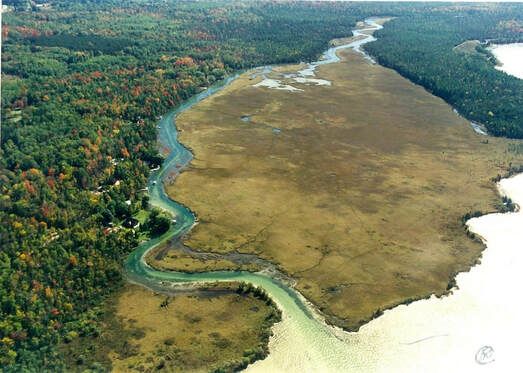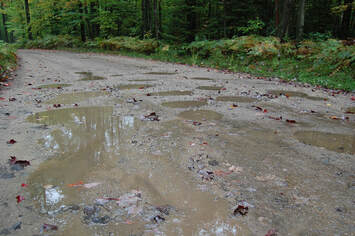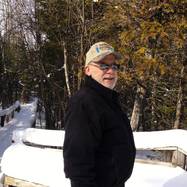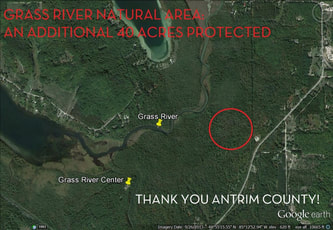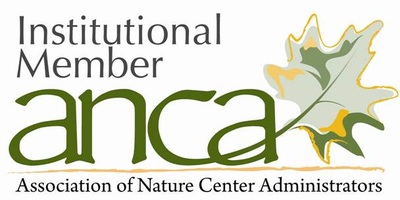RECENT NEWSLETTERS, "IN OTTER NEWS"TAKE A VIRTUAL TOUR OF GRASS RIVER NATURAL AREA WITH
|
|
We are proud to announce that our 2018 Volunteer of the Year award goes to Phil Jarvi! For those of you who know Phil, this does not come as much of a surprise. He is a Grass River supporter through and through and doesn’t just talk the talk, but also walks the walk. Phil first got introduced to Grass River Natural Area in 2005 and has since helped lead weekly Wildflower Walks, participated in our semi-annual stream monitoring, monitored butterfly populations, helped in our native gardens, and has served as a docent, greeting people at the front desk of our nature center. We are so grateful for the efforts of Phil and appreciate his commitment to GRNA and our mission. You can read more about Phil here.
|
NEW SECTION OF BOARDWALK OPEN TO THE PUBLIC
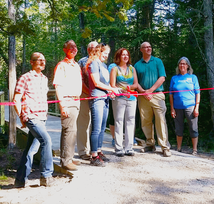
With a crowd of fifty stakeholders looking on, Grass River Natural Area Board of Directors and staff officially opened the new section of reconstructed boardwalk to the public on August 23rd. This $400,000, one-third mile project will provide a safe environment for individuals to explore the natural area, remove impediments to stream flow and fish passage, and increase accessibility for all ages and abilities to engage with the natural world. This is an exciting accomplishment for Grass River Natural Area as well as the community. GRNA Executive Director, Jenn Wright, stated “we are grateful to the community for believing in our ability to make this happen! This project is both the culmination of years of planning and hard work by our team and the impetus to the next phase, which includes reconstruction of the remaining 1.2 miles of boardwalk. As I watch individuals of all ages and abilities explore nature via this new path, I am encouraged and thankful that we live in a community where the natural world is valued and appreciated.”
Also included in the audience were representatives from Gosling Czubak Engineering Sciences, the engineers of the project, as well as representatives from Richter Construction, Inc., the company tasked with replacing the boardwalk, and a representative from Wickcraft Boardwalks, the company who manufactured the components. This cooperative effort would not have been possible without the many generous donations from individuals and foundations, as well as a generous contribution by the Antrim County Commissioners.
Also included in the audience were representatives from Gosling Czubak Engineering Sciences, the engineers of the project, as well as representatives from Richter Construction, Inc., the company tasked with replacing the boardwalk, and a representative from Wickcraft Boardwalks, the company who manufactured the components. This cooperative effort would not have been possible without the many generous donations from individuals and foundations, as well as a generous contribution by the Antrim County Commissioners.
NEW EXECUTIVE DIRECTOR AT GRNA

After an extensive search, Grass River Natural Area, Inc. is excited to announce that Jenn Wright has been named Executive Director. Jenn brings with her extensive experience in development, conservation stewardship, facilities management, human resources and education. Jenn is scheduled to start at GRNA on June 18.
Jenn Wright comes to GRNA from the Kalamazoo Nature Center in Kalamazoo, MI where she has spent the last 17 years. Most recently, Jenn served as Chief Operating Officer where she managed the day-to-day operations of the center. Prior to her time at the Kalamazoo Nature Center, Jenn spent four years at the Chippewa Nature Center in Midland, MI. Read more about Jenn here.
Jenn Wright comes to GRNA from the Kalamazoo Nature Center in Kalamazoo, MI where she has spent the last 17 years. Most recently, Jenn served as Chief Operating Officer where she managed the day-to-day operations of the center. Prior to her time at the Kalamazoo Nature Center, Jenn spent four years at the Chippewa Nature Center in Midland, MI. Read more about Jenn here.
OVER $400,000 RAISED FOR BOARDWALK RECONSTRUCTION PROJECT
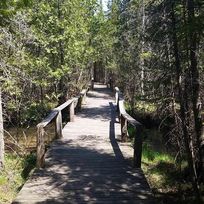
Over the past 16 months GRNA’s Executive Director, Haley Breniser, has worked diligently to raise over $400,000 to support Phase 1 of boardwalk reconstruction which will begin the first week of June. Approximately 1/3 mile of existing 30-year old boardwalk structure will be removed and replaced with long-lasting, ADA materials. This replacement will:
Boardwalk Reconstruction Case for Support
- -Provide a safe environment for individuals to explore the natural area
- -Remove impediments to stream flow and fish passage
- -Increase accessibility for all ages and abilities to engage with the natural world
Boardwalk Reconstruction Case for Support
PERCEPTION PATHWAY SENSORY TRAIL UPGRADED WITH NEW SIGNAGE
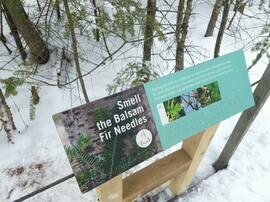
The Perception Pathway is a sensory trail that follows the Fern Trail boardwalk at Grass River. New braille interpretive signage was installed by Image360 - Traverse City, which was designed with the help of Gene Ullery-Smith Graphic Design. The entire project features new braille signage that focuses on using your senses outdoors, along with our "Field Guide to Northwest Michigan" transcribed into braille, a new guide cable and posts, and a new roof on our educational pavilion at the start of the trail. This project was funded by the Michigan Braille Transcribing Fund, the Bellaire Lions Club, the Grand Traverse Regional Community Foundation FOCUS Fund and Access To Recreation Endowment, Great Lakes Energy, the National Association for Interpretation Region 4, and the Elk Rapids Lions Club. Thank you for your support of this project!
LEADERSHIP TRANSITION AT GRASS RIVER
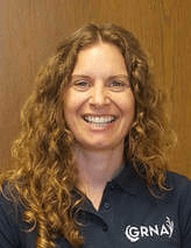
"After 4.5 successful years at Grass River Natural Area, Executive Director, Haley Breniser, is stepping down from her position to pursue other passions and raise her growing family come spring. Haley will be assisting with our transition during the next 4 months as we seek a new Executive Director. We’re going to miss Haley at GRNA, but we’re so excited for her next chapter." - Board of Directors
With her departure on the horizon, Haley reflected, “I feel very fortunate to have followed in the footsteps of many dedicated and courageous Grass River leaders who throughout our history have emerged in the form of community volunteers, county commissioners, board members, and staff. Together over nearly 50 years, we have worked together to create a more ecologically aware community, preserve significant water resources, and sustain a non-profit organization built by the community for the community. I believe the following quote by Ken Robinson contains words to live by as a leader in any field…. ‘The role of a creative leader is not to have all the ideas; it's to create a culture where everyone can have ideas and feel that they're valued.’ I hope that is the legacy I leave behind at Grass River Natural Area, Inc.”
With her departure on the horizon, Haley reflected, “I feel very fortunate to have followed in the footsteps of many dedicated and courageous Grass River leaders who throughout our history have emerged in the form of community volunteers, county commissioners, board members, and staff. Together over nearly 50 years, we have worked together to create a more ecologically aware community, preserve significant water resources, and sustain a non-profit organization built by the community for the community. I believe the following quote by Ken Robinson contains words to live by as a leader in any field…. ‘The role of a creative leader is not to have all the ideas; it's to create a culture where everyone can have ideas and feel that they're valued.’ I hope that is the legacy I leave behind at Grass River Natural Area, Inc.”
CONGRATULATIONS TO OUR 2017 VOLUNTEERS OF THE YEAR!

It is our pleasure to announce Bob and Sheridan Haack as GRNA's 2017 Volunteers of the Year. In addition to volunteering for numerous projects such as our biannual stream monitoring for aquatic insects and joining our Land Management Committee, Bob and Sheridan also conducted their own independent insect surveys on the property during 2017. Their passion to educate others and apply science-based conservation practices at GRNA is an inspiration to us all. Thank you Bob and Sheridan for all of your efforts at GRNA! Read more about Bob and Sheridan here.
GRNA INSTALLS NEW SIGNAGE - THANKS TO MPARKS GRANT!
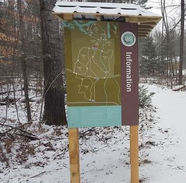
New directional and wayfinding signage went up week of Dec 15th at GRNA! We received a substantial and generous grant through MParks Michigan Recreation and Park Association as well as funding from a private donor to support this project. The lumber used is long-lasting Black Locust, a non-native species of tree in Michigan with an extremely rot resistant heartwood. We are so grateful to have worked with the talented Gene Ullery-Smith at Gene Ullery-Smith Graphic Design as well as the enthusiastic crew at Image360 - Traverse City. And, Chelsea Bay Design created the new logo and brand earlier this year. It takes a village on a project like this! We thank the many volunteers who over the years contributed invaluable input to our long-term "signage plan". Now please, visit us this weekend and enjoy! Grass River is yours to explore...#puremichigan #antrimcounty #mparks#grassriverNA
THE FIELD GUIDE IS HERE!
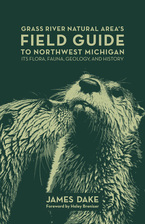
GRNA, Inc. has published a field guide to the region! This book is an authoritative 152-page guide with color photography describing over 400 species in the Northwest Michigan region, including wildflowers, trees, fungi, insects, reptiles, amphibians, birds, mammals, and more! Once released, it will be for sale at Grass River Natural Area and local stores.
Go here for more information.
Go here for more information.
JULY 2016: ADDITIONAL 40 ACRES ADDED TO NATURAL AREA
|
GRNA NOW 1492 ACRES : A TIME FOR GRATITUDE
An additional FORTY contiguous acres has been added to Grass River Natural Area. Thanks to Antrim County for being a proactive partner in protecting Grass River's riparian corridor! Knowing the parcel had unique ecological value, Antrim County commissioners were proactive in acquiring this 40 acre parcel through foreclosure methods with First Rights of Refusal. As a conservation partner and manager of Grass River Natural Area, GRNA, Inc. Board of Directors recommended the protection of this parcel and expressed the great benefits (water quality, wildlife habitat, biodiversity) of forested wetland habitat. THANK YOU ALL for celebrating with us! Below is a great resource. Read more about lowland conifer forests on page 46: http://www.miwaterstewardship.org/…/Michigan.Forest.Communi… |
GRASS RIVER EXPANDS
Grass River Natural Area, Antrim County – On December 18, 2015, Grass River Natural Area, Inc. (GRNA) purchased an additional 9.066 acres of forested wetland located on the south shore of Clam Lake – an ecologically significant peninsula contiguous with existing GRNA land. This important addition enlarges GRNA’s protected lands from 1443 to 1452 total acres.
This acquisition could not have been possible without a substantial matching challenge grant from the J.A. Woollam Foundation and significant matching funds from Mr. and Mrs. Matt and Deb Knudstrup of Rapid City, MI. In addition, many generous donors have given to our Land Protection Fund over the years which aided in the preservation of this parcel. GRNA, Inc. Board of Directors, Executive Director, and staff could not be more grateful for the generosity of all who made this acquisition possible.
This particular parcel has been on GRNA, Inc’s priority list for about 30 years. It is not only significant in order to maintain high water quality within the Elk River Chain of Lakes Watershed but also to maintain the ecological integrity of wildlife habitat for species like the river otter, the common loon and several other species of waterfowl, diverse reptiles and amphibians, and sensitive wetland plant species.
Grass River Natural Area’s (established in 1969) very first conservation efforts centered on acquisition of vital lands that offered resource protection of the Grass River and associated tributaries and wetlands. This 9.066 acre parcel has been a very important “piece of that puzzle” and is finally protected in perpetuity.
This acquisition could not have been possible without a substantial matching challenge grant from the J.A. Woollam Foundation and significant matching funds from Mr. and Mrs. Matt and Deb Knudstrup of Rapid City, MI. In addition, many generous donors have given to our Land Protection Fund over the years which aided in the preservation of this parcel. GRNA, Inc. Board of Directors, Executive Director, and staff could not be more grateful for the generosity of all who made this acquisition possible.
This particular parcel has been on GRNA, Inc’s priority list for about 30 years. It is not only significant in order to maintain high water quality within the Elk River Chain of Lakes Watershed but also to maintain the ecological integrity of wildlife habitat for species like the river otter, the common loon and several other species of waterfowl, diverse reptiles and amphibians, and sensitive wetland plant species.
Grass River Natural Area’s (established in 1969) very first conservation efforts centered on acquisition of vital lands that offered resource protection of the Grass River and associated tributaries and wetlands. This 9.066 acre parcel has been a very important “piece of that puzzle” and is finally protected in perpetuity.
TOP 10 NORTHERN MICHIGAN SUMMER ESCAPES
In July 2012, "Traverse, Northern Michigan's Magazine" listed Grass River Natural Area as one of the top ten Northern Michigan Summer Escapes (read the full article).

